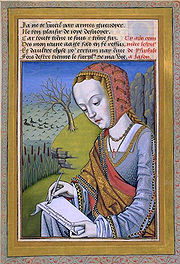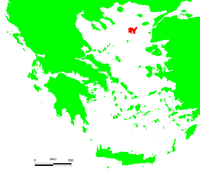
Hypsipyle
Encyclopedia

Greek mythology
Greek mythology is the body of myths and legends belonging to the ancient Greeks, concerning their gods and heroes, the nature of the world, and the origins and significance of their own cult and ritual practices. They were a part of religion in ancient Greece...
, Hypsipyle (Ὑψιπύλη) was the Queen of Lemnos
Lemnos
Lemnos is an island of Greece in the northern part of the Aegean Sea. Administratively the island forms a separate municipality within the Lemnos peripheral unit, which is part of the North Aegean Periphery. The principal town of the island and seat of the municipality is Myrina...
, daughter of Thoas
Thoas (Tauri king)
Thoas was a son of the god Dionysus and Ariadne, the daughter of Cretean king Minos. Some however consider him to be Theseus’s son, together with his brother Oenopion...
and Myrina
Myrina (mythology)
In Greek mythology, the name Myrina or Myrine may refer to the following individuals:* Myrina, a queen of the Amazons. According to Diodorus Siculus, she led a military expedition in Libya and won a victory over the people known as the Atlantians, but was less successful fighting the Gorgons In...
.

Aphrodite
Aphrodite is the Greek goddess of love, beauty, pleasure, and procreation.Her Roman equivalent is the goddess .Historically, her cult in Greece was imported from, or influenced by, the cult of Astarte in Phoenicia....
cursed the women of the island for having neglected her shrines. All the women developed extreme body odor
Body odor
Body odor or body odour, sometimes colloquially abbreviated as B.O., is the smell of bacteria growing on the body. The bacteria multiply rapidly in the presence of sweat, but sweat itself is almost completely odorless to humans....
that made them repugnant to the men of the nation. The men took up with female slaves taken on raids on Thrace
Thrace
Thrace is a historical and geographic area in southeast Europe. As a geographical concept, Thrace designates a region bounded by the Balkan Mountains on the north, Rhodope Mountains and the Aegean Sea on the south, and by the Black Sea and the Sea of Marmara on the east...
. The women of the island decided upon revenge and, in one night, killed all their male relatives. Hypsipyle alone spared a male. She hid her father, Thoas
Thoas (Tauri king)
Thoas was a son of the god Dionysus and Ariadne, the daughter of Cretean king Minos. Some however consider him to be Theseus’s son, together with his brother Oenopion...
, from the vengeful plan.
Soon after the androcide, Jason
Jason
Jason was a late ancient Greek mythological hero from the late 10th Century BC, famous as the leader of the Argonauts and their quest for the Golden Fleece. He was the son of Aeson, the rightful king of Iolcus...
and the Argonauts
Argonauts
The Argonauts ) were a band of heroes in Greek mythology who, in the years before the Trojan War, accompanied Jason to Colchis in his quest to find the Golden Fleece. Their name comes from their ship, the Argo, which was named after its builder, Argus. "Argonauts", therefore, literally means...
stopped at Lemnos on their way to Colchis
Colchis
In ancient geography, Colchis or Kolkhis was an ancient Georgian state kingdom and region in Western Georgia, which played an important role in the ethnic and cultural formation of the Georgian nation.The Kingdom of Colchis contributed significantly to the development of medieval Georgian...
. The Argonauts remained on Lemnos for several months and, during that time, had extensive relations with the women of Lemnos. Jason impregnated Hypsipyle and swore eternal fidelity to her. The product of that pregnancy was twins, Euneus
Euneus
In Greek mythology, Euneus was a son of Jason and Queen Hypsipyle of Lemnos; he had a twin brother whose name is variously given as Nebrophon, Thoas or Deipylus. They were separated from their mother after she was exiled from the island for having spared her own father Thoas...
and Nebrophonus (or Deiphilus or Thoas).
Jason sailed away and quickly forgot his vows.
The Lemnian women, angry at her having spared her father, forced Hypsipyle to flee for her life. She and her sons were taken by pirates and sold to Lycurgus
Lycurgus of Nemea
Lycurgus was the mythological king of Nemea, son of Pheres and Periclymene, brother of Admetus. He was the husband of Eurydice and father of Opheltes. His tomb was in the grove of the Nemean Zeus....
, king of Nemea. She was given charge of Lycurgus's son, Archemorus.
When the Argives (of Aeschylus
Aeschylus
Aeschylus was the first of the three ancient Greek tragedians whose work has survived, the others being Sophocles and Euripides, and is often described as the father of tragedy. His name derives from the Greek word aiskhos , meaning "shame"...
's Seven Against Thebes
Seven Against Thebes
The Seven against Thebes is the third play in an Oedipus-themed trilogy produced by Aeschylus in 467 BC. The trilogy is sometimes referred to as the Oedipodea. It concerns the battle between an Argive army led by Polynices and the army of Thebes led by Eteocles and his supporters. The trilogy won...
or Statius
Statius
Publius Papinius Statius was a Roman poet of the 1st century CE . Besides his poetry in Latin, which include an epic poem, the Thebaid, a collection of occasional poetry, the Silvae, and the unfinished epic, the Achilleid, he is best known for his appearance as a major character in the Purgatory...
' Thebaid
Thebaid
The Thebaid or Thebais is the region of ancient Egypt containing the thirteen southernmost nomes of Upper Egypt, from Abydos to Aswan. It acquired its name from its proximity to the ancient Egyptian capital of Thebes....
) marched against Thebes, they met Hypsipyle and made her show them a fountain where they could get water. She set down Archemorus when she did this, and he was killed by a snake in her absence. Lycurgus wanted revenge upon Hypsipyle, but she was protected by Adrastus
Adrastus
Adrastus or Adrestus , traditionally translated as "nonparticipant" or "uncooperative", was a legendary king of Argos during the war of the Seven Against Thebes.-Mythological tradition:...
, the leader of the Argives.
Primary sources
- EuripidesEuripidesEuripides was one of the three great tragedians of classical Athens, the other two being Aeschylus and Sophocles. Some ancient scholars attributed ninety-five plays to him but according to the Suda it was ninety-two at most...
, Hypsipyle (fragmentary) - OvidOvidPublius Ovidius Naso , known as Ovid in the English-speaking world, was a Roman poet who is best known as the author of the three major collections of erotic poetry: Heroides, Amores, and Ars Amatoria...
, Heroides 6 - HyginusHyginusHyginus can refer to:People:*Gaius Julius Hyginus , Roman poet, author of Fabulae, reputed author of Poeticon astronomicon*Hyginus Gromaticus, Roman surveyor*Pope Hyginus, also a saint, Bishop of Rome about 140...
, Fables 15, 74 - StatiusStatiusPublius Papinius Statius was a Roman poet of the 1st century CE . Besides his poetry in Latin, which include an epic poem, the Thebaid, a collection of occasional poetry, the Silvae, and the unfinished epic, the Achilleid, he is best known for his appearance as a major character in the Purgatory...
, Thebaid 5.28-721 - Valerius FlaccusGaius Valerius FlaccusGaius Valerius Flaccus was a Roman poet who flourished in the "Silver Age" under the emperors Vespasian and Titus and wrote a Latin Argonautica that owes a great deal to Apollonius of Rhodes' more famous epic....
, Argonautica II, 72-427 - ApollodorusApollodorusApollodorus of Athens son of Asclepiades, was a Greek scholar and grammarian. He was a pupil of Diogenes of Babylon, Panaetius the Stoic, and the grammarian Aristarchus of Samothrace...
, Bibliotheke I, ix, 17; III, vi, 4 - Apollonius Rhodius, Argonautica I, 609-909
- Lactantius Placidus, Commentarii in Statii Thebaida iv.717, v.613-675

